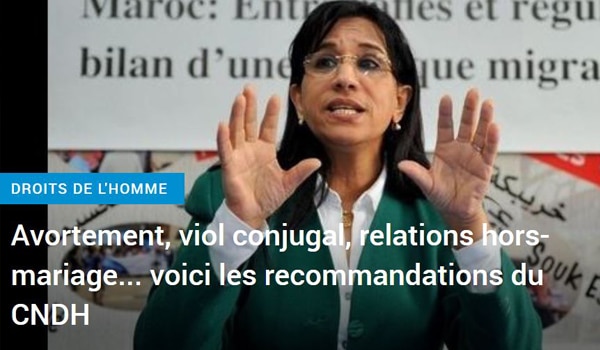
In a memorandum to the Government and Parliamentof Morocco, the National Council of Human Rights (CNDH) is clearly in favour ofchanging certain provisions of the Moroccan Penal Code, in general makingabortion legal on wider grounds but also changing Articles 449 to 452, whichcall for imprisonment for illegal abortion. The memorandum insists that the lawtake into account the “psychological and social security” of thewoman, as well as the safety of her health. For the CNDH, these reasons justifythe right to abortion in the first three months of pregnancy. They add:”A woman suffering from mental disorders has the right to have an abortionwithout the authorisation of the husband though, of course, under the controlof the family judge”.
They also oppose the criminalisation of non-marital sex and call for thedecriminalisation of consensual sexual relations between adults and reject thecriminalisation of homosexuality. In short, the Council chaired by FatimaBouayach recommends the deletion of Articles 489 to 493.
These recommendations arose after Hajar Raissouni was pardoned by the King.
As regards marital rape, responding to the demands of a large part ofthe feminist movement, the CNDH also calls for a new article in the nextversion of the Penal Code, incriminating marital rape because marriage does notforce a wife of to have sexual relations with her husband.
The head of the government, El Othmani, responded three days later bysaying he is opposed to any relaunch of the debate on the issue of abortion at ameeting of the Justice and Development Party (PJD). Nor does he wish to denywhat has already been agreed. “There was a national debate in 2015 on theissue of abortion. HM King Mohammed VI validated the recommendations of aspecial commission that led the dialogue. His recommendations were, moreover,included in the draft reform of the Penal Code.” He added, however: “Ourposition is clear on issues that do not respect the national constants. We willremain categorical about everything related to the Islamic referential. Hard togo back after finding a compromise.”
Whatever his meaning in these last lines, the special commission’srecommendations have not been implemented in law or practice.SOURCES: 2M.ma, by Mohammed HamzaHachlaf, 1 November 2019 ; 2M.ma, 4 November 2019 (les deux en français)



